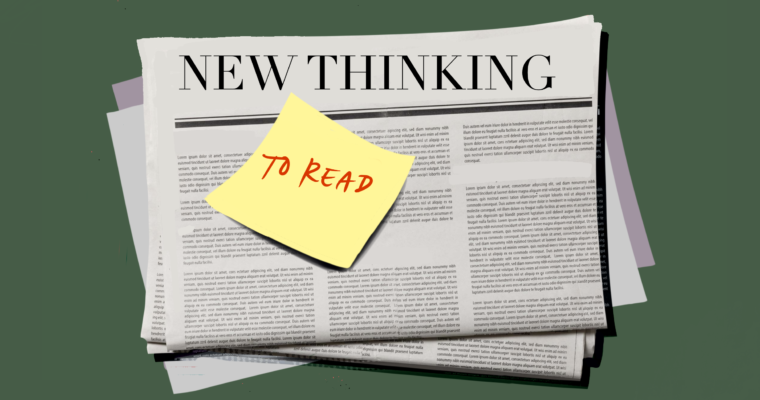Why women are crucial to our coronavirus response, how patents impede our progress towards resolving the pandemic, and what an erosion of trust means for our society. That and more in this week’s selection of #NewThinkintheNews.
1 | America’s coronavirus response must center on women. And the Black Plague helps show how in NBC by Lynn Parramore
“Feminist scholars have long pointed out that economists, political scientists and historians tend to think of the market and the state as the key spheres of reality — while regarding the home and the family as afterthoughts. But as the changes in medieval Europe in the wake of a terrible pandemic illustrate, when women are freed from burdens in the home and gain opportunities to participate fully in all aspects of life and work, the future grows brighter for everyone.”
2 | Patents vs. the Pandemic in Project Syndicate, co-authored by Arjun Jayadev and Joseph Stiglitz
“In responding to the pandemic, the global scientific community has shown a remarkable willingness to share knowledge of potential treatments, coordinate clinical trials, develop new models transparently, and publish findings immediately. In this new climate of cooperation, it is easy to forget that commercial pharmaceutical companies have for decades been privatizing and locking up the knowledge commons by extending control over life-saving drugs through unwarranted, frivolous, or secondary patents, and by lobbying against the approval and production of generics. … It’s time for a new approach. Academics and policymakers have already come forward with many promising proposals for generating socially useful – rather than merely profitable – pharmaceutical innovation. There has never been a better time to start putting these ideas into practice.”
3 | COVID-19 and the Trust Deficit, in Project Syndicate by Mike Spence
“The problem, as we warned back in 2012, is that we are living in an era of policymaking paralysis. “Government, business, financial, and academic elites are not trusted,” we wrote. “Lack of trust in elites is probably healthy at some level, but numerous polls indicate that it is in rapid decline, which surely increases citizens’ reluctance to delegate authority to navigate an uncertain global economic environment.” Change those last words to “navigate a highly chaotic public-health and economic shock,” and the statement loses none of its relevance today.
4 | Condivergence: Thinking fast and acting slow in the pandemic war in The Edge Malaysia by Andrew Sheng
“There will be no return to the old normal. Equilibrium was going anyway with the trade war. Technology was already changing the supply chains and business models. The pandemic only destroyed the old offline big mall business model faster as everyone shifts to online business. The only problem is that most policymakers do not have the data, or the understanding as to how, to make that transition without huge costs to jobs and businesses, at least in the short run, other than to run larger deficits…. The real winners will be those who learn, adapt and innovate so that all of us emerge stronger.”
5 | The EU should issue perpetual bonds, in Project Syndicate, by George Soros
“The EU is facing a once-in-a-lifetime war against a virus that is threatening not only people’s lives, but also the very survival of the Union. If member states start protecting their national borders against even their fellow EU members, this would destroy the principle of solidarity on which the Union is built… Instead, Europe needs to resort to extraordinary measures to deal with an extraordinary situation that is hitting all of the EU’s members. This can be done without fear of setting a precedent that could justify issuing common EU debt once normalcy has been restored. Issuing bonds that carried the full faith and credit of the EU would provide a political endorsement of what the European Central Bank has already done: removed practically all the restrictions on its bond purchasing program.”
Every week, we share a few noteworthy articles that showcase the work of new economic thinkers around the world. Subscribe to receive these shortlists directly to your email inbox.
